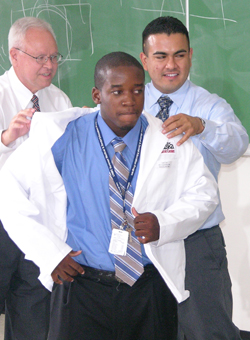 (EDITOR’S NOTE: This is the seventh in a series of stories about a move to ban affirmative action in Nebraska and the potential impact such a policy change would have at UNMC.)
(EDITOR’S NOTE: This is the seventh in a series of stories about a move to ban affirmative action in Nebraska and the potential impact such a policy change would have at UNMC.)
On Tuesday, 80 scholars from the Summer Medical Dental Education Program (SMDEP) donned white coats — a symbolic start to a summer in which they will make initial steps toward possible careers in health care.
This is the third summer UNMC will host SMDEP scholars.
A ballot initiative being circulated in Nebraska that seeks to ban affirmative action could hinder SMDEP and other programs UNMC uses to achieve a diverse faculty and student body.
 |
Casmir Ezim, an SMDEP student from Prince George’s Community College (Md.), receives his white coat on Tuesday. A ballot initiative aimed at banning affirmative action stands to hinder SMDEP and other programs UNMC uses to recruit a diverse student body and faculty. |
UNMC is one of only 12 campuses in the nation to host the SMDEP program — which is funded by a $1.2 million grant from The Robert Wood Johnson Foundation. Dr. Pamies serves as principal investigator for the UNMC SMDEP grant. Other institutions involved with the SMDEP include Yale University, Columbia University, Duke University and Case Western Reserve University.
SMDEP allows talented rising freshmen and sophomore undergraduate students who come from groups that are underrepresented in the dental and medical professions to spend six weeks at participating institutions studying the fundamentals in the core sciences of medical and dental school.
Factors that affect SMDEP selection include race, gender, socio-economic background and geographical disadvantages such as living in a rural area. If the initiative passes in Nebraska, UNMC would be prohibited from considering race and/or gender when selecting future SMDEP scholars.
This summer, the program also will place greater emphasis on health disparities among underserved populations. UNMC SMDEP scholars will do research projects focused on disparities and will coordinate health-related activities for youth groups from underrepresented communities.
The program already has paid dividends to UNMC in its mission of recruiting a diverse student body.
Eleven SMDEP scholars have been accepted into the UNMC College of Dentistry and several others have interviewed for admission into the College of Medicine.
“In order to adequately train health care providers for Nebraska, we need to admit classes of students to our colleges and programs that represent the full variety of the state’s current and future population,” said Hugh Stoddard, Ph.D., director of the curriculum development office in the College of Medicine.
“To accomplish this goal, we need to recruit qualified students from rural locations, students from ethnic and racial minorities, and other students who represent communities that are underserved in medicine.
|
|
Affirmative action policies and programs — such as the SMDEP — open the doorway to opportunities for women and people of color in public contracting, public employment and public education.
SMDEP offers benefits well beyond improved preparation for medical and dental school, said Giovanni Jones, who coordinates the program at UNMC.
She noted the case of a former UNMC SMDEP scholar who took lessons learned during her experience with the program to form a heart-health education program that serves an underserved Hispanic community near her Mississippi undergraduate institution.
“Because of what she learned during the SMDEP program here, she was able to spot a need in her own community and she had the tools to address it,” Jones said. “That speaks volumes about the value of this program.”
A ban on affirmative action, Jones said, could prevent other scholars from underrepresented populations from having such experiences in the future.
If you would like a member of UNMC’s Affirmative Action Speaker’s Bureau to give a presentation to a campus group or civic organization, please contact Jo Giles at 559-4696 or jgiles@unmc.edu.